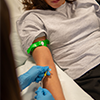Pregnancy is a time of incredible change, both emotionally and physically. As your body stretches to accommodate your growing baby, stretch marks may appear. They’re completely natural and affect many pregnant people, usually on the belly, breasts, thighs, and hips. While it’s not possible to completely prevent stretch marks, there are ways to care for your skin, helping it feel more comfortable and supported.
Here’s a detailed guide on how to care for stretch marks during pregnancy while keeping expectations realistic.
What Are Stretch Marks?
Stretch marks, medically known as striae gravidarum, appear when the skin stretches rapidly due to growth or weight gain. This causes the collagen and elastin fibres in the skin to break, resulting in streaks that can be red, purple, pink, or even dark brown, depending on your skin tone. Over time, they typically fade to lighter shades but may not disappear entirely—and that’s okay.
How to Care for Stretch Marks During Pregnancy
1. Moisturise Regularly
While moisturisers can’t prevent stretch marks entirely, they help keep the skin soft, hydrated, and less prone to itching as it stretches. Consider applying a nourishing lotion or oil twice daily, especially after a shower when your skin is still damp.
Look for products with:
- Cocoa Butter & Shea Butter: Renowned for deep hydration.
- Vitamin E: Supports skin repair and resilience.
- Almond or Coconut Oil: Natural oils that lock in moisture.
- Hyaluronic Acid: Helps maintain skin hydration levels.
Tip: Massage your moisturiser gently in circular motions to boost circulation and improve absorption.
2. Stay Hydrated from the Inside Out
Proper hydration is essential for overall skin health. Drink plenty of water throughout the day to maintain your skin’s elasticity. If plain water isn’t appealing, try:
- Herbal teas (consult your healthcare provider for safe options).
- Water-rich fruits like watermelon, cucumbers, and oranges.
Staying hydrated also helps with other pregnancy symptoms like swelling and fatigue.
3. Follow a Nutrient-Rich Diet
What you eat can have a significant impact on your skin’s health. While a balanced diet won’t prevent stretch marks, it supports your skin’s ability to repair and stay resilient. Focus on:
- Vitamin C: Found in citrus fruits, strawberries, and bell peppers, this vitamin helps boost collagen production.
- Vitamin E: Found in nuts, seeds, and green leafy vegetables, it supports skin health.
- Zinc: Helps with skin repair and is found in lean meats, legumes, and whole grains.
- Healthy Fats: Avocados, olive oil, and fatty fish like salmon provide essential fatty acids for skin elasticity.
4. Practise Gentle Belly Massages
Massage can enhance blood flow and stimulate collagen production. Use a gentle moisturiser or oil, and try light circular motions on your belly, hips, and thighs. This can be a calming, mindful way to connect with your baby while caring for your skin.
5. Stay Active with Safe Exercise
Engaging in gentle prenatal exercises can promote healthy circulation and support your skin’s elasticity. Activities like walking, swimming, and prenatal yoga are safe and beneficial (consult your healthcare provider before starting any new exercise routine).
Exercise also helps manage weight gain, reducing excessive skin stretching—but remember, some stretch marks are inevitable regardless of how active you are.
6. Manage Weight Gain Gradually
Healthy, steady weight gain allows your skin to adjust more gradually, reducing extreme stretching. Follow your healthcare provider’s guidance on how much weight is recommended for your pregnancy stage. Remember, weight gain is a natural and essential part of pregnancy, so be kind to yourself.
7. Consider Safe Skincare Treatments Post-Pregnancy
After pregnancy, stretch marks often fade naturally over time. If they bother you, there are safe, dermatologist-recommended treatments, such as:
- Topical Retinoids (Postpartum Only): May reduce the appearance of stretch marks after pregnancy.
- Laser Therapy: Helps fade deeper stretch marks by stimulating collagen production.
- Microneedling: A treatment that promotes skin renewal.
Discuss these options with a dermatologist after giving birth, especially if you’re breastfeeding.
What to Avoid
- Harsh Scrubs or Exfoliants: They can irritate sensitive, stretched skin.
- Expensive “Miracle” Products: Be cautious of products claiming to erase stretch marks—there is no scientific evidence that they work.
- Unapproved Treatments During Pregnancy: Some active skincare ingredients, like retinoids, are unsafe during pregnancy. Always consult your healthcare provider before using any new skincare product.
Be Kind to Yourself
It’s important to remember that stretch marks are a natural part of your body’s journey through pregnancy. They are a testament to the incredible strength and adaptability of your body as it nurtures new life. Over time, they will likely fade, but even if they don’t, they’re a beautiful reminder of what your body has accomplished.
Your worth is not defined by your skin’s appearance. Embrace self-care, be patient with your body, and celebrate the incredible person you are.
You are strong. You are beautiful. You are enough.













 Packages & Prices
Packages & Prices  Important Info & Policies
Important Info & Policies  Your Scan
Your Scan